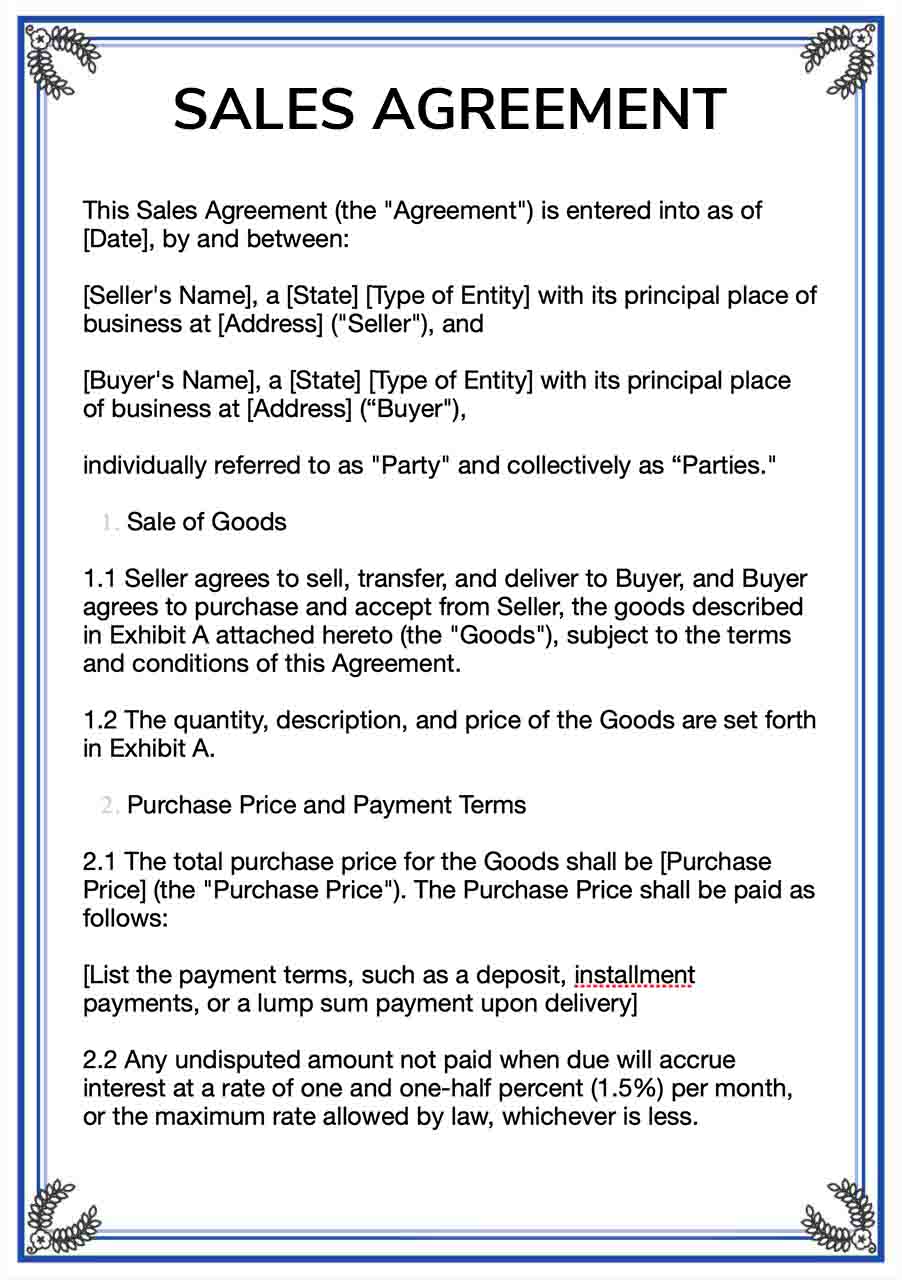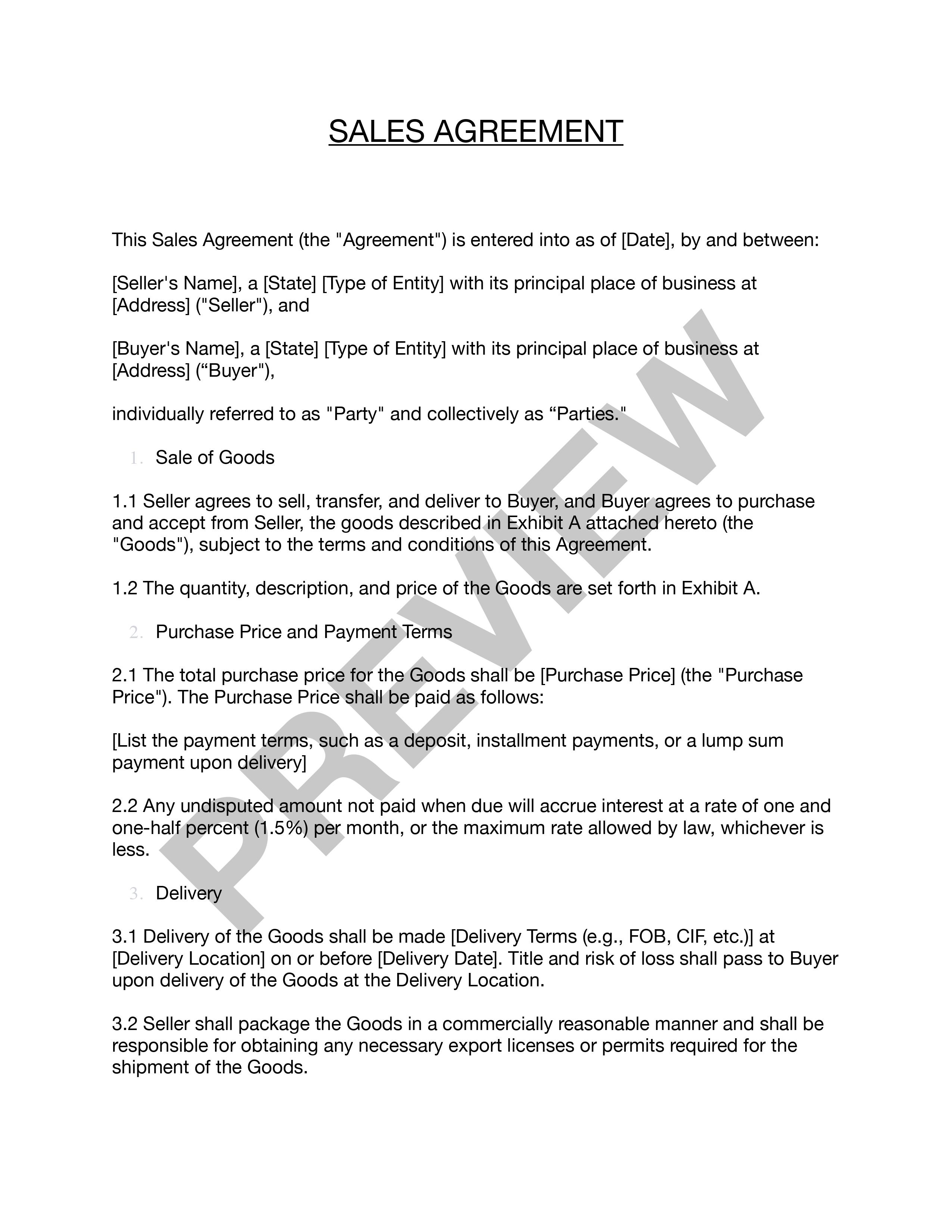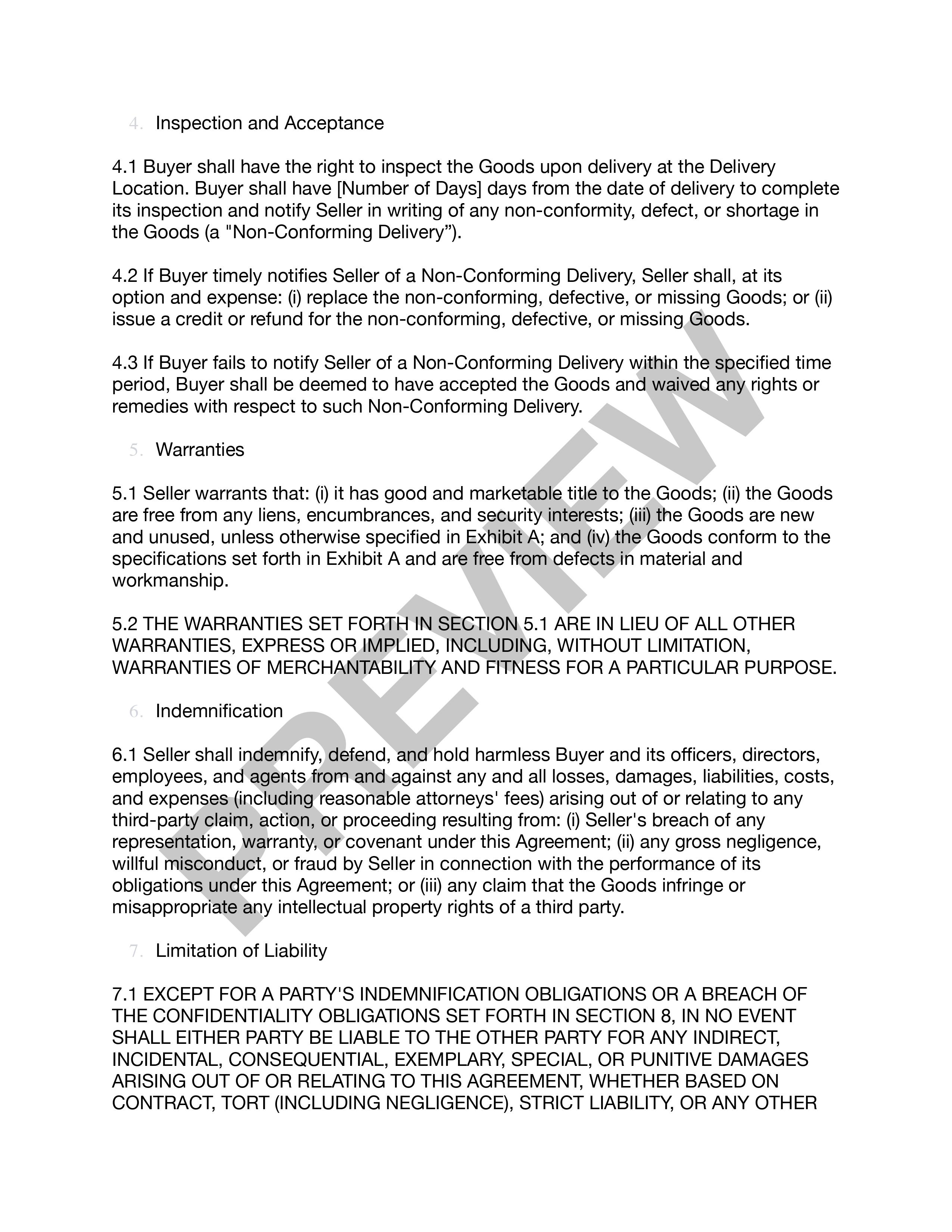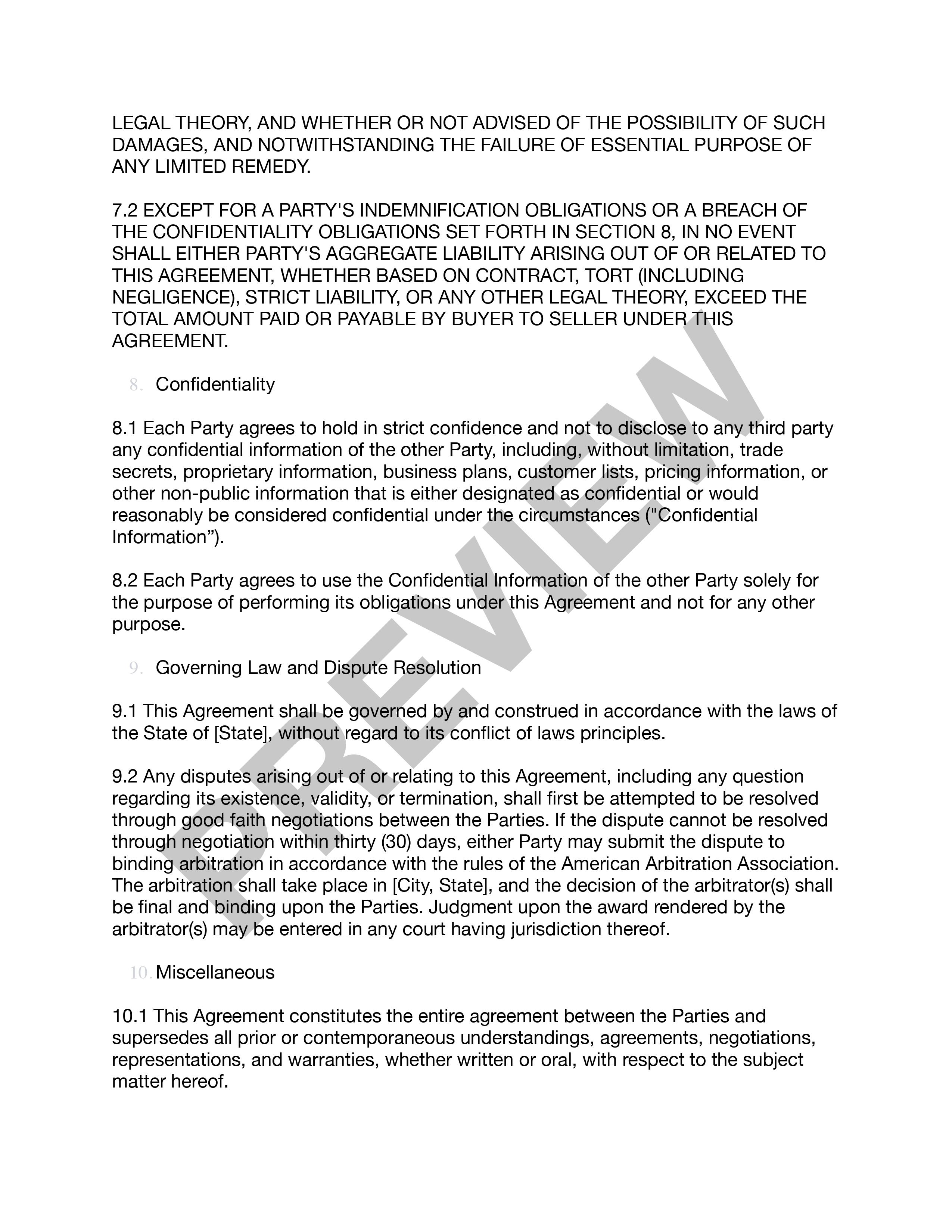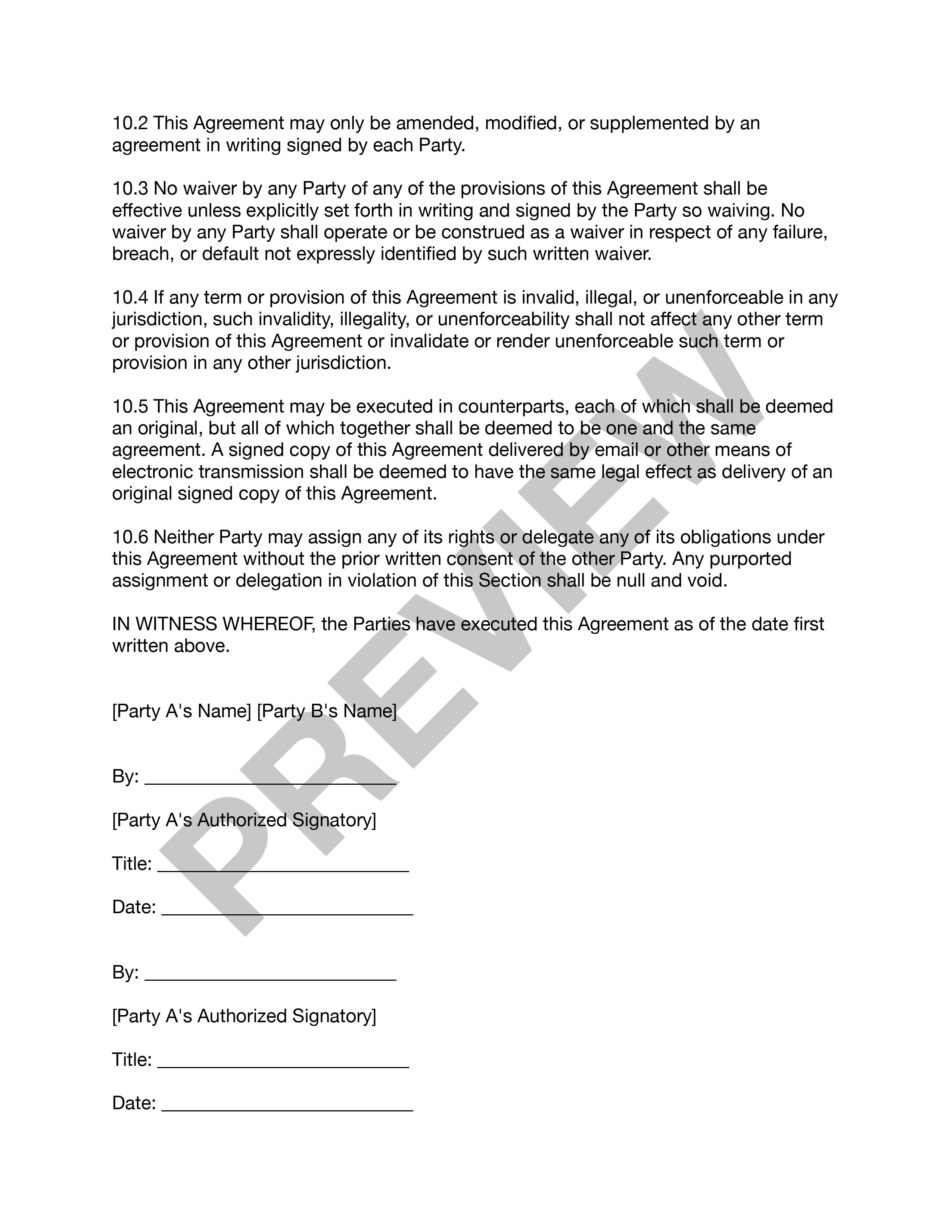Generate Sales Agreement
A sales agreement is a legally binding contract that establishes the terms of a sales transaction between a buyer and a seller.
Last Updated April 2023
What is a Sales Agreement?
A sales agreement is a legally binding contract between two parties, typically a buyer and a seller, that outlines and governs the terms and conditions of a sales transaction. It serves as a comprehensive document that defines the rights, obligations, and responsibilities of both parties, including the description of the goods or services being sold, the purchase price, payment terms, delivery arrangements, warranties, intellectual property rights, dispute resolution mechanisms, and other relevant provisions. The sales agreement provides clarity, protection, and enforceability for all parties involved, ensuring a transparent and mutually beneficial transaction.
Types of Sales Agreements
There are several types of sales agreements based on the specific context and nature of the sales transaction. Here are some common types:
-
Goods Sales Agreement: This type of agreement is used for the sale of tangible goods, such as products, equipment, or vehicles.
-
Services Sales Agreement: This agreement pertains to the sale of services, such as consulting, professional services, or maintenance contracts.
-
Real Estate Sales Agreement: Also known as a property sales agreement or a purchase agreement, this type of agreement is used for the sale of real estate properties, including residential or commercial properties.
-
Distribution Agreement: This agreement is entered into between a manufacturer or supplier and a distributor, outlining the terms of the distribution relationship, including the rights and responsibilities of both parties.
-
Consignment Agreement: This type of agreement is used when a person or business places their goods with a consignee for sale, with the consignee receiving a portion of the proceeds as commission.
-
Commission Sales Agreement: This agreement is commonly used in sales representative relationships, where the salesperson earns a commission on the sales they generate.
-
Franchise Agreement: A franchise agreement is entered into between a franchisor and a franchisee, granting the franchisee the right to operate a business using the franchisor's brand, system, and support.
-
Licensing Agreement: This type of agreement is used when intellectual property, such as trademarks, patents, or copyrights, is licensed to another party for use in exchange for royalties or licensing fees.
These are just a few examples of the different types of sales agreements, and each may have unique considerations and provisions specific to the industry or transaction involved.
What should be included in a sales agreement?
A sales agreement should include several key elements to ensure clarity and protection for both parties involved. Here are some important components to include:
-
Parties: Clearly state the names and contact information of the buyer and seller involved in the transaction.
-
Description of Goods or Services: Provide a detailed description of the goods or services being sold, including specifications, quantities, quality standards, or any other relevant details.
-
Purchase Price: Specify the agreed-upon price for the goods or services, including any applicable taxes or additional costs. Outline the payment terms, such as whether it is a lump sum payment, installments, or milestones, and include due dates and acceptable payment methods.
-
Delivery Terms: Define the terms of delivery, including the location where the goods will be delivered, shipping method, and any associated costs or responsibilities for shipping, insurance, or customs clearance.
-
Warranties: Outline any warranties or guarantees provided by the seller regarding the quality, performance, or condition of the goods or services being sold. Include details such as the duration of the warranty and the remedies available to the buyer in case of defects or non-conformity.
-
Intellectual Property Rights: If applicable, address any intellectual property rights associated with the goods or services, including licenses, usage rights, or restrictions. Specify ownership and any limitations on the use, reproduction, or distribution of intellectual property.
-
Terms and Conditions: Include any specific terms and conditions related to the sale, such as returns or exchanges, limitations of liability, confidentiality clauses, dispute resolution mechanisms, or governing law.
-
Acceptance and Amendments: Establish provisions for the acceptance of the offer, including a specified period for the buyer to review and accept the terms. Define the process for making amendments or modifications to the agreement, ensuring that they are documented in writing and agreed upon by both parties.
-
Termination: Include provisions that address the circumstances under which the agreement can be terminated, such as breaches, non-performance, or mutual agreement. Outline the rights and obligations of both parties upon termination.
-
Signatures: Require the signatures of authorized representatives from both the buyer and seller to indicate their agreement and acceptance of the terms.
It is important to note that the specific content and provisions of a sales agreement may vary depending on the nature of the transaction, industry, and applicable laws.
Are sales agreements only for large transactions?
No, sales agreements are not limited to large transactions. Sales agreements can be used for transactions of various sizes and scopes, ranging from small purchases to significant business deals. Whether it's a simple transaction between individuals or a complex commercial agreement, having a sales agreement in place helps establish clarity, protect the interests of both parties, and minimize potential disputes. The content and complexity of the sales agreement may vary based on the nature and scale of the transaction, but the fundamental purpose remains the same: to define the terms and conditions of the sales transaction and ensure both parties are aware of their rights and obligations.
Frequently Asked Questions
Yes, a sales agreement is typically a legally binding contract between the parties involved in a sales transaction. Once both parties have agreed to the terms and conditions outlined in the sales agreement and have provided their consent, the agreement becomes legally enforceable.
A sales agreement is important for several reasons:
-
Clarity and Understanding: A sales agreement helps establish clear expectations and understanding between the buyer and the seller. It outlines the terms and conditions of the sales transaction, including the description of goods or services, price, payment terms, delivery arrangements, warranties, and other relevant provisions. This clarity reduces the chances of misunderstandings or disputes between the parties.
-
Legal Protection: A well-drafted sales agreement serves as a legally binding contract that protects the rights and interests of both parties. It provides a framework for resolving disputes and offers legal remedies if either party breaches the agreement. Having a written agreement in place strengthens the legal position of the parties and provides a basis for enforcing their rights if needed.
-
Risk Management: A sales agreement helps manage risks associated with the sales transaction. It can address issues such as liability limitations, warranties, indemnification provisions, and dispute resolution mechanisms. By clearly defining the responsibilities and obligations of each party, the agreement helps mitigate risks and potential liabilities.
-
Establishing Terms and Conditions: A sales agreement allows the parties to negotiate and agree upon specific terms and conditions that are important to them. It provides an opportunity to address key aspects of the transaction, such as pricing, payment terms, delivery timelines, quality standards, and any special requirements. This helps ensure that both parties are on the same page and have a mutual understanding of what is expected.
-
Professionalism and Business Relations: Having a sales agreement in place demonstrates professionalism and seriousness in conducting business. It instills confidence in both the buyer and the seller that the transaction is being handled professionally and fairly. This can help establish and maintain positive business relationships and enhance the overall reputation of the parties involved.
-
Legal Compliance: Depending on the jurisdiction and the nature of the transaction, certain legal requirements and regulations may need to be addressed in the sales agreement. By ensuring compliance with applicable laws, regulations, and industry standards, the sales agreement helps protect the parties from legal risks and potential penalties.
In summary, a sales agreement is important as it provides clarity, legal protection, risk management, and establishes mutually agreed-upon terms and conditions. It helps facilitate smooth and transparent transactions while protecting the interests of both the buyer and the seller.
A sales agreement and a bill of sale are both legal documents used in sales transactions, but they serve different purposes and have distinct characteristics. Here's the difference between a sales agreement and a bill of sale:
-
Sales Agreement: A sales agreement, also known as a sales contract or a purchase agreement, is a comprehensive contract that outlines the terms and conditions of a sales transaction between a buyer and a seller. It covers various aspects of the sale, including the description of goods or services, purchase price, payment terms, delivery arrangements, warranties, and other relevant provisions. A sales agreement is typically used when the transaction involves more complex terms, ongoing obligations, or the need for specific protections and representations from both parties.
-
Bill of Sale: A bill of sale, on the other hand, is a simpler document that primarily serves as evidence of the transfer of ownership or title of goods from a seller to a buyer. It provides a record of the transaction and includes basic information about the buyer, seller, and the goods being sold. A bill of sale typically includes details such as a description of the goods, the purchase price, the date of the sale, and the signatures of both parties. It is commonly used for straightforward transactions, such as the sale of a vehicle, personal property, or other tangible assets.
In summary, a sales agreement is a comprehensive contract that outlines the terms and conditions of a sales transaction, while a bill of sale is a simpler document that serves as proof of the transfer of ownership or title. A sales agreement covers a broader range of terms and provisions, whereas a bill of sale primarily focuses on documenting the details of the sale and the transfer of ownership.
A sales agreement and an invoice are two distinct documents used in the context of sales transactions. Here's the difference between a sales agreement and an invoice:
-
Sales Agreement: A sales agreement, also known as a sales contract or a purchase agreement, is a legally binding contract that outlines the terms and conditions of a sales transaction between a buyer and a seller. It is typically a more comprehensive document that covers various aspects of the sale, such as the description of goods or services, purchase price, payment terms, delivery arrangements, warranties, and other relevant provisions. A sales agreement is typically prepared before or at the time of initiating the sales transaction and serves as a contractual agreement between the parties involved.
-
Invoice: An invoice, on the other hand, is a document issued by the seller to the buyer after the completion of a sale. It serves as a billing statement that requests payment for the goods or services provided. An invoice typically includes information such as the seller's contact information, buyer's contact information, a description of the goods or services sold, quantities, prices, payment terms, and the total amount due. It serves as a record of the transaction and provides details necessary for the buyer to make the payment.
In summary, a sales agreement is a comprehensive contract that outlines the terms and conditions of a sales transaction, while an invoice is a billing document issued after the completion of the sale to request payment. The sales agreement sets the framework and terms for the transaction, while the invoice serves as a formal request for payment based on those terms.
Sales agreements are utilized by a wide range of individuals, businesses, and organizations involved in various industries and sectors. Here are some examples of who typically uses sales agreements:
-
Businesses: Both small and large businesses across industries use sales agreements to formalize transactions with customers or other businesses. This includes retailers, manufacturers, wholesalers, service providers, and more.
-
Individuals: Sales agreements can be used by individuals engaging in personal transactions, such as selling personal property, vehicles, or real estate.
-
E-commerce Platforms: Online marketplaces and e-commerce platforms often have their own standardized sales agreements that govern the relationship between the platform and sellers or buyers using their services.
-
Franchisors and Franchisees: Franchise agreements serve as a type of sales agreement between franchisors (owners of the franchise system) and franchisees (those granted the right to operate a business using the franchisor's brand and system).
-
Distributors and Suppliers: Distribution agreements outline the terms and conditions of the relationship between suppliers or manufacturers and distributors. These agreements often address aspects like product pricing, territories, marketing support, and exclusivity.
-
Licensing and Intellectual Property Owners: Licenses for intellectual property, such as trademarks, patents, or copyrights, are governed by sales agreements that grant usage rights to licensees and outline the terms of the license.
-
Real Estate Professionals: Real estate agents, brokers, and property owners utilize sales agreements, also known as purchase agreements or property sales agreements, to facilitate the sale and purchase of real estate properties.
-
Independent Sales Representatives: Independent sales representatives or agents may use sales agreements when representing manufacturers or suppliers in negotiating and finalizing sales with customers.
These are just a few examples, and the use of sales agreements can extend to various other scenarios and industries where goods or services are being bought and sold. The specific parties involved in a sales agreement depend on the nature of the transaction and the roles of the buyer and the seller.
